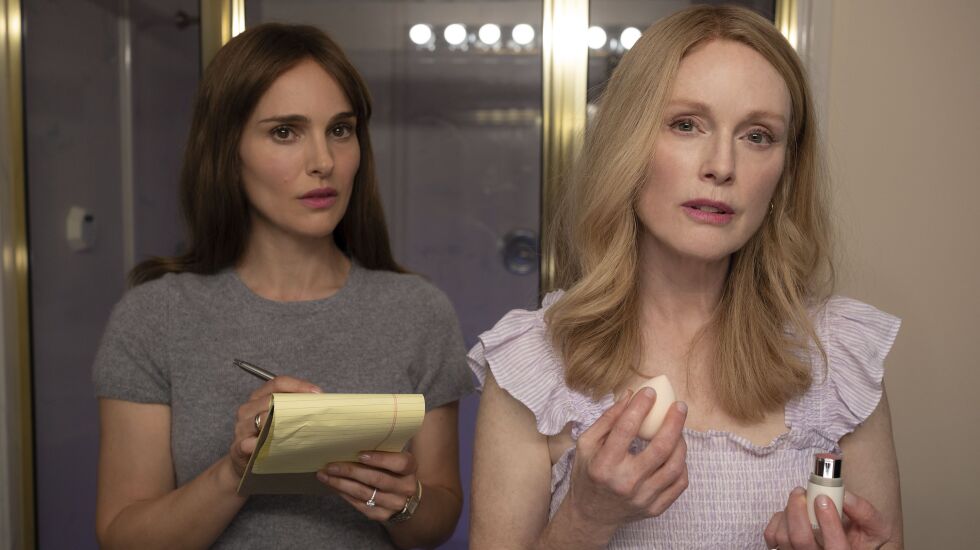
In the opening scene in Todd Haynes’ delightfully twisted social satire “May December,” Julianne Moore’s Gracie is in the kitchen of her beautiful Savannah, Georgia, home, fretting about this and that as she preps to host a barbecue, with most of the guests already out back.
This Gracie, she’s a passive-aggressive force who can create a piece of drama out of nothing.
When Grace’s husband takes a break from tending the grill to grab a beer, Grace notes quietly, “That’s two.”
When a gaggle of kids burst through the kitchen on their way to the roof, Gracie takes her college-bound son aside, says, “Keep an eye on things for me, OK?” and as her son walks away, Gracie exclaims, “Honestly,” as if a major crisis has been narrowly averted.
Then, as the melodramatic score builds to the kind of crescendo that would normally accompany a life-changing event, Gracie opens the refrigerator and laments, “I don’t think we have enough hot dogs.”
Cut to a shot of the grill, where some 30 hot dogs are cooking, and another two dozen are waiting in pans on either side.
Gracie. I think you have enough hot dogs.
This meticulously choreographed, slightly unnerving and low-key hilarious sequence is indicative of the tone throughout, as director Haynes (“Far From Heaven,” “I’m Not There,” “Carol”) once again creates a fascinating and twisted slice of the American dream gone sideways.
With Samy Burch’s razor-sharp script providing some fantastically flourishing dialogue passages, frequent Haynes collaborator Julianne Moore delivering the latest in a long line of magnificently calibrated and memorable performances, and Moore’s fellow Oscar winner Natalie Portman turning in equally layered work, this is an intricately crafted study of people who are experts at putting on facades and all too skilled in the art of deception. Moore and Portman are playing characters who are beautiful and intelligent and, in some cases, loved — but also quite awful beneath the smiling and charming surfaces.
Moore’s Gracie Atherton-Yoo became a national tabloid sensation when she was caught in the stock room of the pet store where she worked, having sex with a 13-year-old boy. Gracie was sent to prison, and rightfully so, where she gave birth to a child. The relationship continued, and more than two decades later, Gracie and her now-36-year-old husband Joe (Charles Melton) are living in that house in Savannah (which was paid for with money from a tabloid TV show), with their oldest child already in college and their twins on the verge of graduating high school. (The parallels to the real-life case of Mary Kay LeTourneau are clear. At one point, we catch a glimpse of a People magazine cover of Gracie and her child that exactly duplicates a 1998 People magazine of LeTourneau with her baby that was accompanied by the headline, “The Teacher and the Sixth Grader.”)
Enter Natalie Portman’s Elizabeth Berry, a TV actor best known for a show called “Norah’s Ark” (apparently, she plays some sort of heroic veterinarian). Elizabeth has been cast to play Gracie in an independent film, and Gracie has agreed to grant Elizabeth access to her life for a few days, in the hopes this new project will set the record straight and erase the negative portrayals of Gracie in the tabloids and in an exploitative TV movie.
From the moment Elizabeth arrives in town, leaning into her fame with her oversized glasses and her seductive charm, we begin to see cracks in the façade of the seemingly idyllic life Gracie has carved out over the last two decades.
A box of feces shows up on the front step. (Gracie and Joe cheerfully note this doesn’t happen as frequently as it once does.) When Gracie takes Elizabeth to a flower-arranging class and introduces Elizabeth to the instructor by saying, “She’s playing me in a movie, so I’m trying to show her a good time,” the reply comes: “That I don’t doubt.” We also learn that Gracie’s supposedly thriving cake business depends on the steady business of a handful of locals who feel sorry for her.
Every scene in “May December” is an exquisitely constructed piece of craftsmanship, as we see how Gracie is still controlling Joe after all these years, and Joe is just beginning to realize his entire existence as an adult was formed and manipulated by a predator. At the same time, Elizabeth is revealed to be a narcissistic disrupter, whether she’s delivering a totally inappropriate explanation of how she films sex scenes to a class of high schoolers, crashing family events where she doesn’t belong, or taking Method training to new heights, or should we say lows.

Moore and Portman are twin forces in their scenes together, each of them looking to extract what they can from this brief encounter and not really caring about the other, while the supporting cast, including Charles Melton as Joe, Elizabeth Yu and Gabriel Chung as the twin children of Gracie and Joe, D.W. Moffett as Gracie’s ex-husband and Cory Michael Smith as Gracie’s oldest son, is excellent.
“May December” is pretty and alluring, but if you start to look a little closer, you see the darkness and the ugliness that has been there all along.







